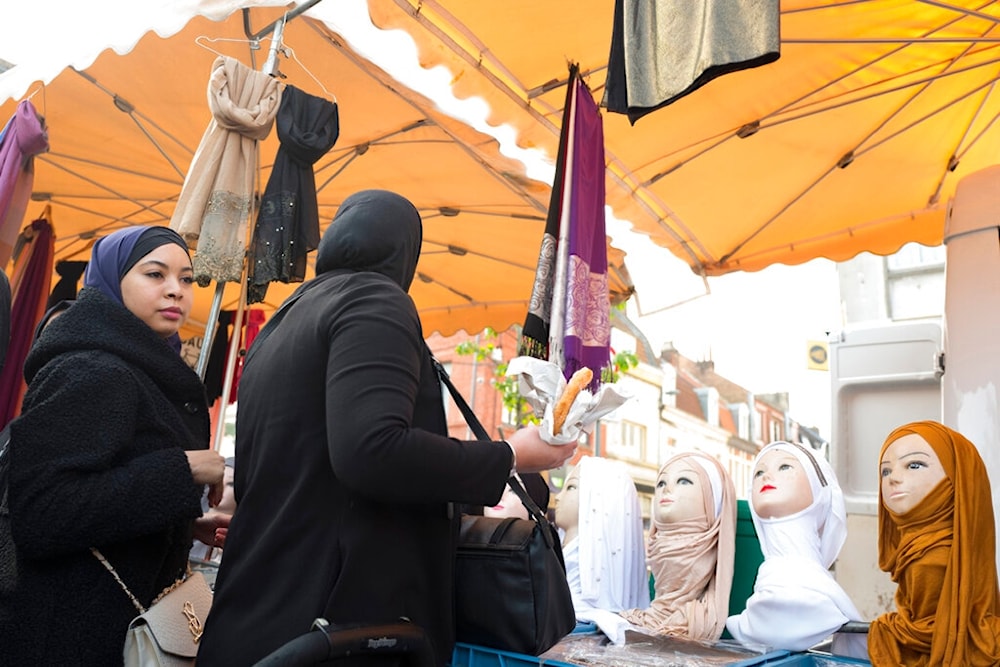EU report exposes alarming surge in anti-Muslim sentiment
Over half (55%) of victims of racist violence reported experiencing psychological issues such as depression or anxiety as a direct result of their experiences.
-

A woman watches mannequins presenting Muslim veils at an open air market in Lille, northern France, Thursday, Oct. 31, 2019. (AP)
The European Union Agency for Fundamental Rights (FRA) released on Wednesday a comprehensive report detailing the discrimination and challenges faced by Muslims across the EU, shedding light on the significant rise in anti-Muslim racism since 2016.
The report, titled "Being Muslim in the EU – Experiences of Muslims," is based on extensive surveys conducted between 2021 and 2022 involving nearly 10,000 Muslim respondents across the bloc.
The findings reveal persistent and widespread discrimination, particularly in employment, housing, education, and healthcare, with Austria standing out as the country with the highest reported rate of discrimination, scoring a staggering 71%.
The report underscores how racism and prejudice continue to marginalize Muslim communities, with Muslim women, especially those wearing traditional attire, facing the most severe forms of exclusion.
"Muslim women who at least sometimes wear traditional or religious clothing (such as a headscarf, hijab or niqab) in public are more likely to experience racist harassment than those who do not: 27 %, compared with 16 %," the report found.
Moreover, Muslims report unmet healthcare needs at double the rate of non-Muslims, reflecting systemic disparities in access to services.
Despite the pervasive discrimination, many incidents remain unreported, as individuals express mistrust in authorities or doubt that their complaints would lead to meaningful change.
Read more: France bans annual march commemorating death of black Frenchman
To put it in perspective, over half (55%) of victims of racist violence reported experiencing psychological issues such as depression or anxiety as a direct result of their experiences.
Additionally, 22% said they now fear leaving their homes or going to public spaces after being physically abused.
Alarmingly, more than one-third (37%) of victims suffered injuries but chose not to seek medical help, and 10% required medical assistance or hospitalization due to the severity of the attacks they endured.
Call for policy
The FRA calls for stronger policy measures to tackle these issues, urging EU Member States to address the root causes of anti-Muslim racism and promote social inclusion.
The report also stresses the importance of intersectionality, illustrating how multiple identities—such as religion, ethnicity, and gender—compound experiences of discrimination, with young Muslims facing particular challenges in accessing education and employment opportunities.
"Muslim women, men, and children are targeted not just because of their religion, but also because of their skin color and ethnic or immigrant background," FRA said in its report.
In light of these findings, the FRA stresses the need for coordinated EU-wide efforts to combat racism and ensure equal rights and opportunities for all citizens.
Read more: France's Hijab ban: A poor excuse for secularism at the Olympics
France's racism issue
Human rights organizations in France have raised serious concerns over a dramatic rise in racist sentiments within the country, attributing much of the blame to the right-wing National Rally (NR) party.
A recent survey conducted by the National Consultative Commission on Human Rights (CNCDH) in July evaluates the NR's role in promoting nationalism through anti-immigration policies.
According to the CNCDH report, there has been a significant decline in the index of tolerance for the second consecutive year, a trend described as "substantial and rare."
The report noted that this decline is closely linked to a rejection of multiculturalism in France, with immigrants, especially Muslims, often portrayed in media as a "threat" to the nation.
Shockingly, more than half of those surveyed (51%) expressed feeling increasingly unwelcome in their own country, with 56% believing there are too many immigrants in France.
"For several years, the National Rally has benefited from an increased audience at the polls, but also in the media and institutions… there is a whole group of media figures and intellectuals who give voice and try to impose their ways of seeing immigration and diversity," the report stated.

 4 Min Read
4 Min Read








